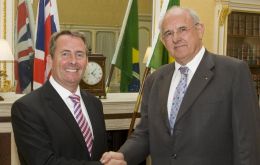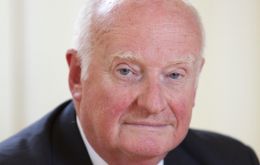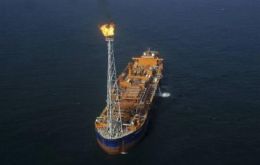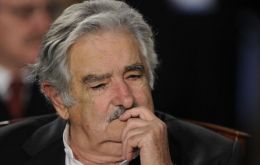MercoPress. South Atlantic News Agency
Stories for July 2011
-
Tuesday, July 5th 2011 - 19:13 UTC
When Falklands and the World Cup 1982 nerve-wracked the Foreign Office

According to recently released document the government of Prime Minister Margaret Thatcher wanted Scotland to crash out of the 1982 World Cup in Spain in an attempt to avoid a diplomatic headache over the Falklands conflict.
-
Tuesday, July 5th 2011 - 19:00 UTC
Statue of President Reagan, crucial ally of Mrs Thatcher, unveiled in London

A statue of former US President Ronald Reagan has been unveiled at a ceremony outside the American embassy in central London. The invited guests include former UK Prime Minister Baroness Thatcher - who was a close ally of Reagan when they were both in power in the 1980s.
-
Tuesday, July 5th 2011 - 18:50 UTC
Brazil and UK discuss defence cooperation and Atlantic security in London

Strengthening Brazil-UK defence cooperation agreement and building Atlantic and wider security are among the issues to be addressed by UK and Brazil during the three day visit of Defence minister Dr Nelson Jobim to Britain
-
Tuesday, July 5th 2011 - 16:29 UTC
How seafood, oil and tourism made ’squidionaires’ and the Falklands’ rich

Caroline Graham from London's Mail on Sunday visited the Falkland Islands for a week and chance had it she arrived when a commercial oil strike was announced by one of the several companies exploring offshore the Islands.
-
Tuesday, July 5th 2011 - 15:44 UTC
Uruguay and Brazil move closer to a partnership in wind power projects

Uruguay’s state owned power company UTE moved closer to linking with Brazil’s Eletrobras for wind projects after its board gave the go-ahead to explore a partnership.
-
Tuesday, July 5th 2011 - 15:21 UTC
Falklands’ Argos fast-track 3D processing anticipate drilling in late 2011/2012

Falkland Islands Argos Resources Limited reports encouraging progress on the processing and interpretation of its recently acquired 3D seismic data over its 100% owned licence PL001 in the North Falkland basin. With fast track processing of the 3D data Argos could be ready for exploratory drilling in late 2011/2012.
-
Tuesday, July 5th 2011 - 15:14 UTC
Rockhopper considers options to extract and store oil from Falklands’ Sea Lion well

Rockhopper Exploration is looking at some form of floating platform as the likeliest option to produce its Sea Lion oil and gas discovery offshore the Falkland Islands. But the company wants to complete delineation of the field before progressing to the front-end engineering and design (FEED) stage, reports Offshore.
-
Tuesday, July 5th 2011 - 06:14 UTC
Argentina announces aid for areas suffering from the volcanic ash cloud

Argentine President Cristina Fernandez de Kirchner announced a package of measures to mitigate the effects of ash spewing from Chile's Puyehue volcano that has upended air travel, tourism and farming in Patagonia.
-
Tuesday, July 5th 2011 - 06:08 UTC
President Rousseff relations with 10 party coalition remain strained

The six-month old administration of Brazilian President Dilma Rousseff’s is again under strain following on her strong character reactions, thus casting doubts about the passing of her legislative agenda, which is already considerably delayed.
-
Tuesday, July 5th 2011 - 05:57 UTC
Uruguay re-opens human rights violations from the 1973/1985 military regime

Uruguay’s government announced June 27 that it will reopen more than 80 human rights violations allegedly committed during the 1973-85 military dictatorship. The decision follows a long legislative battle but nevertheless remains highly controversial since the latest opinion polls indicate a majority of Uruguayans, 55%, want an end to the discussion.
